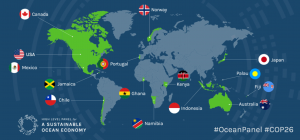United States Joins Global Effort to Forge Sustainable Ocean Economy
US Climate Envoy John Kerry announced the US participation in a sustainable oceans alliance that aims to promote sustainable fishing and support efforts to capture and store carbon in seabeds through kelp farming, amount other things.

GLASGOW | 2 November 2021 | The United States has joined the High Level Panel for a Sustainable Ocean Economy (Ocean Panel), which is comprised of 14 nations representing nearly 40 percent of the world’s coastlines, 30 percent of its exclusive economic zones (EEZs), 20 percent of its fisheries, and 20 percent of its shipping fleet.
Members of the Ocean Panel coordinate policies with the goal of creating a “sustainable ocean economy” across their jurisdictions. The organization has endorsed sustainable management of wild fish stocks as well as the deployment of carbon capture and storage in the sub-seabed through growing and sinking massive kelp beds. Such strategies sequester carbon in sub-seabed geological formations, but there have been fears of unexpected consequences if they are not deployed properly and with international cooperation.
“I have long followed the work of the Ocean Panel, and I am in complete agreement that creating a sustainable ocean economy, informed by the latest science, is essential to secure a prosperous future for our communities and for our planet,” said John Kerry, the US Special Presidential Envoy for Climate.
Co-chaired by Norway and Palau, the Ocean Panel includes Australia, Canada, Chile, Fiji, Ghana, Indonesia, Jamaica, Japan, Kenya, Mexico, Namibia, Norway, Palau, and Portugal.
The panel had earlier published a 24-page roadmap to achieving a sustainable ocean economy, with 100 percent of the oceans under their jurisdictions operating under Sustainable Ocean Plans by 2025.
The document sets several goals to be achieved by 2030, including the restoration of wild fish stocks to sustainable levels and the reduction of dead zones caused by excess agricultural runoff that nourishes massive algae blooms. The roadmap also calls for increased farming of seaweed for food, fuel, and sustainable plastic alternatives, in addition to carbon capture.
Please see our Reprint Guidelines for details on republishing our articles.

